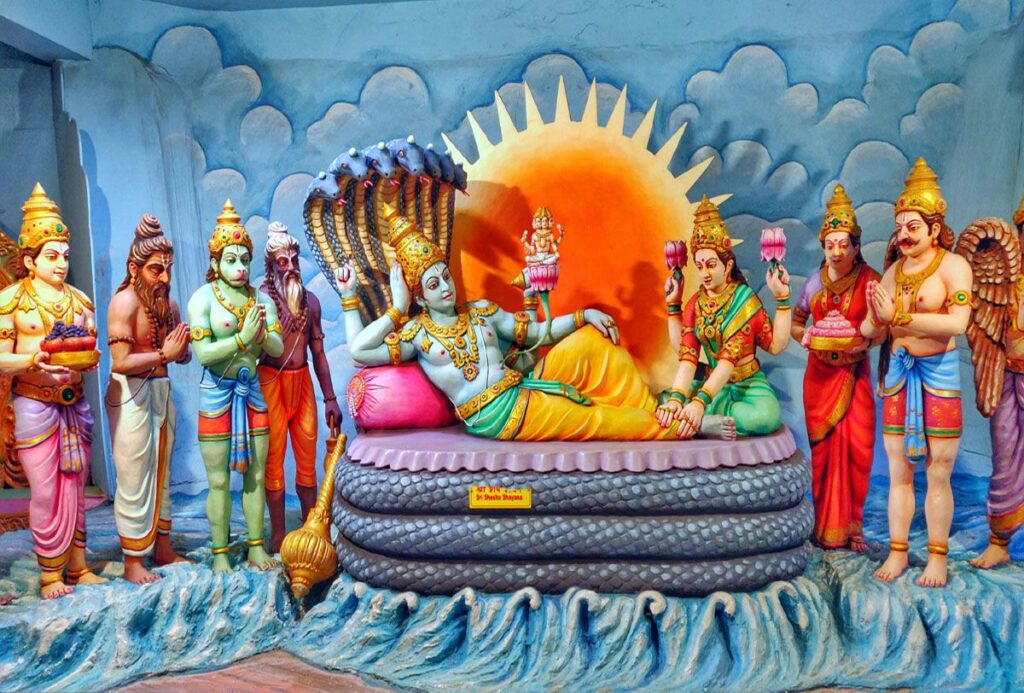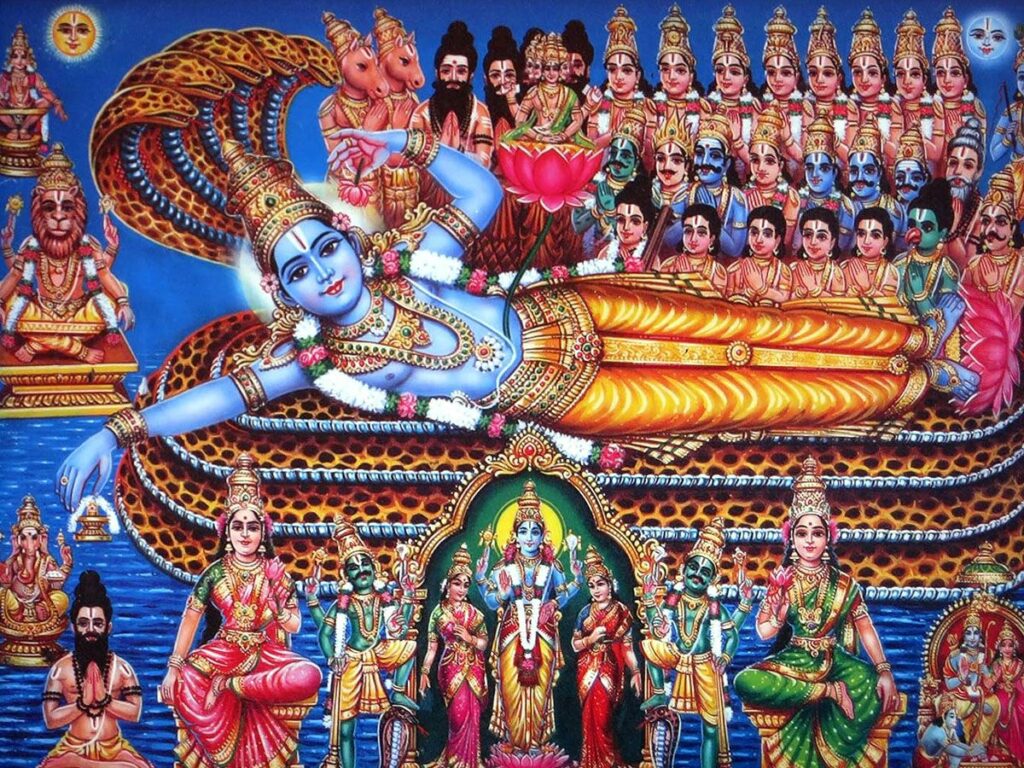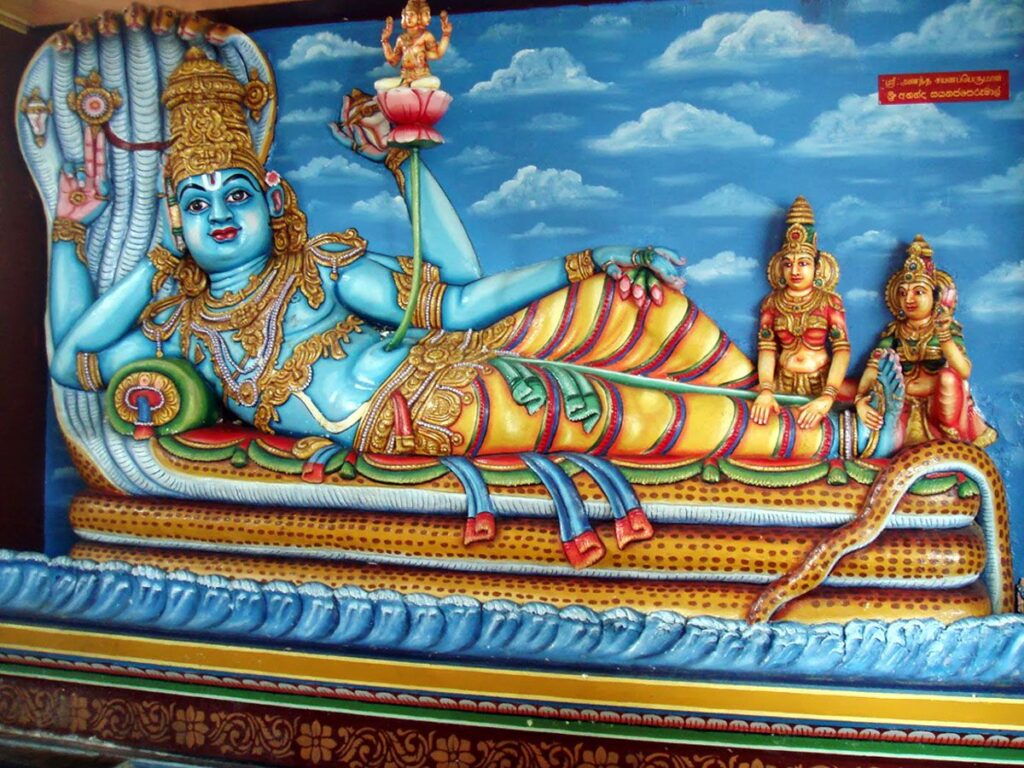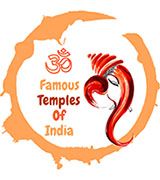Vaikuntha Ekadashi | Mukkoti Ekadashi
Vaikuntha Ekadashi, also known as Mukkoti Ekadashi, is a highly revered Hindu festival that holds immense significance in the spiritual calendar. Celebrated on the eleventh day of the waxing moon in the month of Margashirsha (December-January), Vaikuntha Ekadashi is dedicated to Lord Vishnu, the preserver and protector of the universe. Devotees observe this day with great devotion and perform various rituals to seek the blessings of the Lord and attain spiritual liberation. In this article, we delve into the rich history, significance, rituals, and cultural aspects of Vaikuntha Ekadashi.

Contents
- 1 History of Vaikuntha Ekadashi | Mukkoti Ekadashi:
- 2 Legend of Vaikuntha Ekadashi | Mukkoti Ekadashi:
- 3 FAQ:
- 3.0.1 What is Vaikuntha Ekadashi?
- 3.0.2 What is the significance of Vaikuntha Ekadashi?
- 3.0.3 What are the rituals performed on Vaikuntha Ekadashi?
- 3.0.4 What are some of the dos and don’ts of Vaikuntha Ekadashi?
- 3.0.5 What are some of the myths and legends associated with Vaikuntha Ekadashi?
- 3.0.6 What are some of the benefits of observing Vaikuntha Ekadashi?
- 3.0.7 What time is Vaikuntha Ekadashi in 2023?
- 3.0.8 What is the benefit of fasting on Vaikunta Ekadasi?
- 3.0.9 What is special about Vaikunta Ekadasi?
History of Vaikuntha Ekadashi | Mukkoti Ekadashi:
The history of Vaikuntha Ekadashi dates back to ancient times. The earliest mention of Vaikuntha Ekadashi is found in the Padma Purana, which is a Sanskrit text that was written in the 5th or 6th century CE.
According to the Padma Purana, the origin of Vaikuntha Ekadashi is associated with an asura named Murasura. Murasura was a powerful demon who had received a boon from Brahma that made him invincible. The gods were afraid of Murasura and they sought the help of Lord Vishnu.
Lord Vishnu fought with Murasura and eventually defeated him. After defeating Murasura, Lord Vishnu created a goddess named Yogamaya from his divine energy. Yogamaya slew Murasura and saved the gods.
In gratitude for Yogamaya’s help, Lord Vishnu gave her the name “Ekadashi” and declared that she would be capable of vanquishing the sins of all the people of Earth. It is believed that those who observe a fast on Vaikuntha Ekadashi will be freed from their sins and attain moksha, or liberation from the cycle of birth and death.
The celebration of Vaikuntha Ekadashi has spread to many parts of the world, including India, Nepal, and Sri Lanka. In India, Vaikuntha Ekadashi is one of the most important festivals in the Hindu calendar. It is a day of great religious significance and is celebrated with great pomp and ceremony.
In the Telugu-speaking states of India, Vaikuntha Ekadashi is also known as Mukkotiyuda Ekadasi. The name “Mukkotiyuda” means “three crores”. It is believed that observing a fast on Vaikuntha Ekadashi is equivalent to observing a fast on three crores of Ekadashis.
Read More >> Significance of Lord Ganesha Idol

Legend of Vaikuntha Ekadashi | Mukkoti Ekadashi:
The legend of Vaikunta Ekadasi is one of the most popular legends in Hinduism. It tells the story of how Lord Vishnu defeated the demon Muran and opened the gates of Vaikuntha, his heavenly abode, to all devotees.
The story begins with the demon Muran, who was granted a boon by Brahma that made him invincible. Muran began to terrorize the gods, and they were unable to defeat him. They turned to Lord Vishnu for help.
Lord Vishnu fought Muran in a fierce battle, but he was unable to defeat him. Muran then pursued Vishnu to a cave called Simhavati, where Vishnu was resting.
While Vishnu was sleeping, Muran entered the cave and tried to kill him. However, a goddess named Yogamaya, who was created from Vishnu’s divine energy, appeared and killed Muran.
Vishnu was pleased with Yogamaya, and he gave her the name “Ekadashi.” He also declared that all those who observed a fast on Ekadashi would be granted moksha, or liberation from the cycle of birth and death.
This legend is the basis for the significance of Vaikuntha Ekadasi. Devotees believe that by observing a fast on this day, they will be granted the blessings of Lord Vishnu and will be able to attain moksha.
Read More>> Significance of OM Symbol | AUM Symbol

Significance of Vaikuntha Ekadashi | Mukkoti Ekadashi:
- Doorway to Vaikuntha (Heavenly Abode): Vaikuntha Ekadashi is believed to be the day when the gates of Vaikuntha, Lord Vishnu’s celestial abode, are wide open. Devotees believe that by observing fasts and engaging in spiritual practices on this day, they can attain entry into Vaikuntha and be free from the cycle of birth and death (moksha).
- Reconciliation of Deities: Legend has it that on this auspicious day, the deities and celestial beings who had quarreled earlier are reconciled. Observing Vaikuntha Ekadashi is believed to cleanse one’s sins and pave the way for spiritual harmony and peace.
- Liberation from Sins: Vaikuntha Ekadashi is considered a day of immense spiritual merit. Devotees believe that observing a fast on this day and engaging in prayers and worship can absolve them of sins and purify their soul, leading to spiritual growth.
- Fulfillment of Wishes: It is widely believed that sincere prayers and devotional activities performed on Vaikuntha Ekadashi can lead to the fulfillment of one’s desires. Devotees often seek Lord Vishnu’s blessings for health, prosperity, and overall well-being.
Read More>> Chakrapani Temple Kumbakonam
Rituals and Observances:
- Fasting (Ekadashi Vrat): Devotees observe a strict fast on Vaikuntha Ekadashi, abstaining from food and water for the entire day. The fast is broken on the next day, known as Dwadashi. Fasting is considered a means of purifying the body and mind, allowing devotees to focus on spiritual practices.
- Vishnu Puja and Mantra Chanting: Temples dedicated to Lord Vishnu witness elaborate rituals and puja ceremonies on Vaikuntha Ekadashi. Devotees visit these temples and participate in the chanting of Vishnu Sahasranama (the thousand names of Lord Vishnu) and other sacred mantras.
- Reading Scriptures: Many devotees spend the day reading and reciting religious texts such as the Bhagavad Gita, Ramayana, and Puranas. These texts provide spiritual wisdom and guidance, enhancing the devotee’s understanding of their faith.
- Charitable Acts: Giving to the less fortunate is an integral part of Vaikuntha Ekadashi observances. Devotees engage in charitable acts such as feeding the poor, donating to temples, and supporting various social welfare activities.
- Vrata Parana: The fast is broken on the next day, Dwadashi, during an auspicious time known as “Parana.” Devotees consume a simple meal to conclude their fast and express gratitude for the blessings received.
Read More>> Dakshin Ke Badrinath Temple Hyderabad
Cultural Celebrations:
Vaikuntha Ekadashi is celebrated with great fervor and enthusiasm across India and among Hindu communities worldwide. Temples dedicated to Lord Vishnu, especially those dedicated to Ranganatha (a form of Lord Vishnu), witness elaborate decorations, processions, and special ceremonies. The Sri Ranganatha Swamy Temple in Srirangam, Tamil Nadu, is particularly famous for its grand celebrations during Vaikuntha Ekadashi.
Devotees often engage in bhajans (devotional songs) and kirtans (musical recitations) to express their love and devotion to Lord Vishnu. The atmosphere in temples is charged with spiritual energy as thousands of devotees come together to seek the divine blessings of the preserver of the universe.
Vaikuntha Ekadashi is not merely a religious observance but a profound spiritual journey for devotees seeking closeness to the divine. The rituals and practices associated with this auspicious day are intended to purify the mind, body, and soul, paving the way for spiritual enlightenment and liberation.
As devotees fast, pray, and engage in acts of charity, they symbolically cleanse themselves of worldly attachments and sins, striving to attain a state of spiritual purity. The celebration of Vaikuntha Ekadashi serves as a reminder of the eternal values of love, devotion, and righteousness, as embodied by Lord Vishnu.
In a world often characterized by chaos and uncertainty, festivals like Vaikuntha Ekadashi provide a sacred space for individuals to connect with their spiritual roots and seek solace in the divine. As the gates of Vaikuntha open on this auspicious day, devotees embark on a celestial journey, guided by the belief that true fulfillment lies in the divine presence of Lord Vishnu.
Read More>> 2500 Years Dwarkadhish Temple: Where Miracles Still Happen
FAQ:
What is Vaikuntha Ekadashi?
Vaikuntha Ekadashi is an important Hindu festival that is celebrated on the eleventh day of the waxing moon in the month of Margashirsha (December-January). It is one of the most auspicious Ekadashi days in the Hindu calendar.
What is the significance of Vaikuntha Ekadashi?
Vaikuntha Ekadashi is a day to worship Lord Vishnu, the Supreme Being in Hinduism. It is believed that on this day, the gates of Vaikuntha, the Lord’s abode, are open to all devotees. Devotees observe a fast on this day to seek the Lord’s blessings and to cleanse their bodies and minds.
What are the rituals performed on Vaikuntha Ekadashi?
On Vaikuntha Ekadashi, devotees wake up early in the morning and take a holy bath. They then visit a temple of Lord Vishnu and offer prayers. Some devotees also recite the Vishnu Sahasranāma, a thousand-name hymn to Lord Vishnu. The fast is broken on the following day, Dwadashi Tithi.
What are some of the dos and don’ts of Vaikuntha Ekadashi?
- Dos:
- Wake up early in the morning and take a holy bath.
- Visit a temple of Lord Vishnu and offer prayers.
- Recite the Vishnu Sahasranāma.
- Observe a fast on Ekadashi Tithi.
- Break the fast on Dwadashi Tithi with a sattvik meal.
- Don’ts:
- Eat rice on Ekadashi Tithi.
- Eat onions or garlic on Dwadashi Tithi.
- Engage in any activities that are considered to be harmful, such as violence, anger, or hatred.
What are some of the myths and legends associated with Vaikuntha Ekadashi?
According to Hindu mythology, the churning of the ocean (Sagar Mathana) was performed on this day. On this day, the demons and gods churned the ocean to obtain amrita, the nectar of immortality. During the churning, many treasures emerged from the ocean, including the pot of amrita. The demons and gods fought over the pot of amrita, and eventually the gods were victorious.
It is also believed that on this day, Lord Vishnu appeared to the Pandavas in the Mahabharata. The Pandavas were exiled from their kingdom, and they were living in the forest. Lord Vishnu appeared to them and gave them hope and strength.
What are some of the benefits of observing Vaikuntha Ekadashi?
It is believed that observing Vaikuntha Ekadashi brings many benefits, including:
- Attainment of moksha, or liberation from the cycle of birth and death.
- Achievement of all desires.
- Purification of the body and mind.
- Improvement in health and well-being.
- Attainment of peace and happiness.
What time is Vaikuntha Ekadashi in 2023?
This year, the Vaikuntha Ekadashi fast will be held on December 23, 2023. Vaikuntha Ekadashi is observed on Ekadashi Tithi (11th day) of Shukla Paksha in the month of Margashirsha.
What is the benefit of fasting on Vaikunta Ekadasi?
Spiritual Benefits:
- Attaining Moksha: The ultimate goal of many Hindus is to achieve moksha, liberation from the cycle of birth and death. Observing Vaikuntha Ekadashi with devotion and sincerity is believed to be a potent step towards this liberation, opening the gates of Vaikunta, Vishnu’s celestial abode.
- Purification of Body and Mind: The fast is seen as a way to cleanse oneself of negative thoughts, desires, and past sins. It is believed to detoxify the body and elevate the mind to a state of purity and focus, fostering better spiritual connection.
- Seeking Forgiveness and Blessings: Devotees believe that offering prayers and fasting on Vaikuntha Ekadashi invokes the blessings of Lord Vishnu. It is a way to seek forgiveness for any past transgressions and receive his divine grace.
- Deepening Devotion: The devotional practices associated with the fast, such as reciting mantras, singing hymns, and meditating, further enhance one’s devotion to Lord Vishnu, strengthening the spiritual connection.
Practical Benefits:
- Health and Well-being: The 24-hour fast can be a form of physical detoxification, allowing the body to rest and rejuvenate. This can potentially lead to improved digestion, increased energy levels, and a general sense of well-being.
- Mental Clarity and Discipline: The act of fasting requires self-control and focus, which can have positive spillover effects in other areas of life. It can lead to improved mental clarity, discipline, and willpower.
- Community and Bonding: Celebrating Vaikuntha Ekadashi often involves community gatherings and prayers, offering a sense of belonging and connection with fellow devotees. This can be a source of support and strengthen one’s sense of faith and identity.
What is special about Vaikunta Ekadasi?
Here are some of the specific things that make Vaikunta Ekadashi special:
- It is a day of great spiritual significance. Devotees believe that by observing a fast on this day, they will be granted the blessings of Lord Vishnu and will be able to attain moksha, or liberation from the cycle of birth and death.
- It is a time for community and bonding. Vaikuntha Ekadashi is a time for Hindus from all over to come together to celebrate their faith. It is a time to renew their devotion to Lord Vishnu and to connect with fellow devotees.
- It is a time of spiritual renewal. The fast and the devotional practices associated with Vaikuntha Ekadashi are believed to cleanse the body and mind, allowing for spiritual growth and enlightenment.
